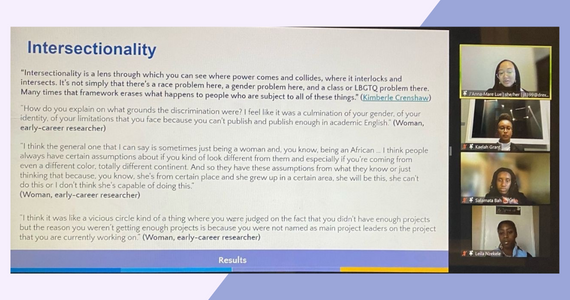Leading Research on Decolonizing Global Water, Sanitation, and Hygiene Initiatives
 Dornsife Global Development Scholars present their research on decolonizing global WASH initiatives at national conference.
Dornsife Global Development Scholars present their research on decolonizing global WASH initiatives at national conference.
August 30, 2022
The Dornsife Global Development Scholars (DGDS) program at Drexel University’s Dornsife School of Public Health (DSPH) is a nationally and internationally recognized capacity-building program for bridging gaps between scientific research, development practice, and applied problem-solving in the context of improving global health.
This program is based on a mentorship model that allows students of all majors and educational levels to work alongside World Vision International, a major international non-government organization (INGO) and the largest distributors of water around the world, on humanitarian efforts that push forward to achieving all U.N. Sustainable Development Goals related to the global agenda prioritizing water, sanitation, and hygiene (WASH).
Last year, World Vision International released a new “Roadmap to Impact” global WASH business plan for 2021-2025. To align with these goals, World Vision requested the support of the Dornsife Global Development Scholars Program to form a first-of-its-kind research group aimed at decolonizing WASH research and initiatives globally, starting with its own donor-funded research programs.
Researchers included Salamata Bah, BS in Computer Science ’23, Drexel College of Computing & Informatics; Kaelah Grant, BS in Psychology with a minor in Neuroscience ’23, College of Arts and Science; J’Anna-Mare Lue, BS/MS in Environmental Engineering dual-degree ’22, Drexel College of Engineering; and Leila Nzekele, BS in Public Health ’22, DSPH.
Together, they investigated inequalities in the WASH sector by centering the experiences of lower- and middle-income countries (LMIC) researchers, examined the root causes of inequities, and explored feasible strategies for moving toward a more equitable future. The primary objective of this work was to build an anonymized, synthesized base of evidence from which future research, guidance, and initiatives that support LMIC research could be built, ensuring that their contributions are not marginalized, but centered.
Upon completing this research, the group was invited to present their research—Decolonizing WASH Research: Results of a qualitative study and consensus-building process to develop principles for increasing equity in WASH Research—at three national conferences (2021 World Vision Community of Practice Meeting, 2021 Colorado WASH Symposium, and 2021 University of North Carolina Water and Health Conference).
To learn more about this research, you can check out their presentation slides followed by a Q+A with researcher Kaelah Grant, both below:
Q+A with Kaelah Grant
Why is this work critical to advancing WASH?
The experiences highlighted in this project provide evidence that colonialist practices remain prevalent in the research relationships between high-income countries (HICs) and LMICs. A goal of World Vision’s “Roadmap to Impact” is to ensure availability and sustainable management of water and sanitation for all, which is known as Sustainable Development Goal #6. However, this cannot be met when inequity stands within an integral component of WASH: the research. WASH solutions are not one-size-fits-all, meaning that the context of each country differs, thus the solutions differ.
A tremendous part of decolonizing WASH research is to amplify the voices of local researchers who have specific expertise in their country’s issues. Removing barriers for LMIC researchers is a solution that would propel location-specific solutions that will allow for the overall advancement of WASH.
What impact do you hope this research will have or have seen it have?
Impact within global health is achieved through collectivism rather than individualism. Therefore, I hope this research can light a path for future decolonizing work. Through presenting the research, we have gained immense positive feedback and were able to educate professionals across a wide variety of educational backgrounds and experiences.
Spreading the message of this work has exemplified that there is an undeniable problem for those who do not experience the inequities outlined in the research. Our work thus far has educated many across the world and I hope it continues to do so. Aside from education, this project has given LMIC researchers an outlet to be heard without fearing the consequences, and I hope that this environment it one day be reflected in the field of WASH research.
You and your collaborators on this project presented at several conferences. How was this experience?
My experiences presenting at the 2021 World Vision Community of Practice Meeting, 2021 Colorado WASH Symposium, and 2021 University of North Carolina Water and Health Conference have been fulfilling and enlightening. The research we’ve done since 2020 has given me a unique knowledge of neo-colonialism within WASH research that has allowed me to teach PhD students, postdocs, established researchers, and other professionals with more educational and practical experience than I have. From our varied audiences, we were able to put together a list of possible action items that were created through an interdisciplinary lens.
Each conference was a learning experience and allowed me to see our work in ways that I never have before. All of the ideas stimulated from the presentations show me that decolonizing the field of WASH is far from over but we are on the right track.
What do you hope to accomplish in your career beyond Drexel?
After I graduate from Drexel in June of 2023, I will get my MPH and then go to medical school.
During my time at Drexel, through the Decolonizing WASH Research Project and the DSGS program, I immersed myself in global/public health and I realized my passion for it. I was always interested in medicine and becoming a physician, but I learned that public health is an integral part of why I love medicine.
My long-term career goal is to become a traveling physician and combine all of my academic interests within the disciplines of social justice, global/public health, psychology, neuroscience, and medicine to best treat marginalized people all over the world.